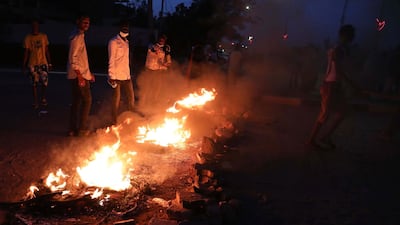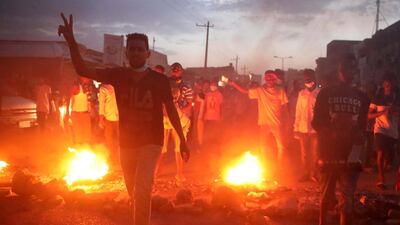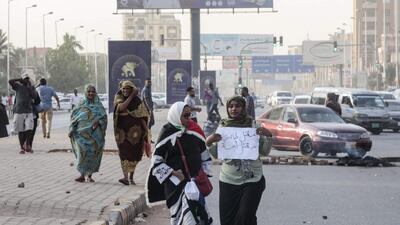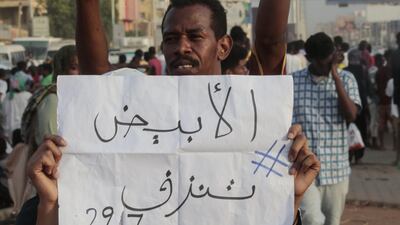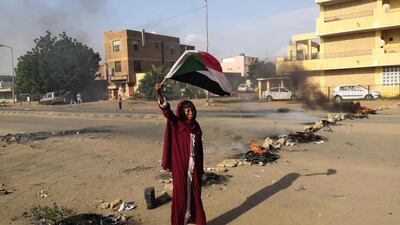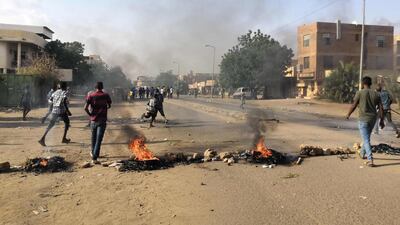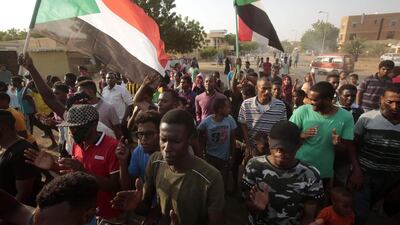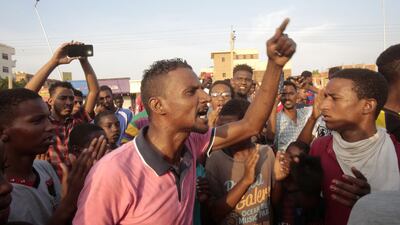Four Sudanese pupils were among five demonstrators shot dead on Monday at a rally against bread and fuel shortages in the country’s interior.
The deaths in the town of Al Obeid underscore the dire economic situation that sparked mass protests against longtime leader Omar Al Bashir last December, leading to his downfall in April.
The military council that has ruled since Mr Al Bashir's removal and the leaders of protest groups are due to meet for a new round of talks on Tuesday about the future of the country's government.
The military council and the protesters signed a power-sharing agreement this month to form a joint administration to lead the country to civilian rule in the coming years, but there are details still to be pinned down.
There is still tension between the armed forces and protesters after a crackdown on a protest camp on June 3 reportedly led to 127 deaths.
But an investigation by prosecutors and the military council said that only 17 people were killed on June 3 and 87 between then and June 10.
It identified eight officers involved in the crackdown on the protest camp, including three from the Rapid Support Forces, but the military council insists it did not order the militia to clear the sit-in.
Protesters rejected the findings and called for an independent inquiry.
The US envoy to the country, Donald Booth, told the military council that no matter how thorough their investigation was, it would face questions given its possible role in the raid.
After the deaths of the five people in North Kordofan state’s Al Obeid on Monday, protest organisers called for nationwide rallies.
The Sudanese Professionals Association, one of the main protest groups, said live bullets were used on a "rally of school students".
Hundreds of protesters later rallied in Khartoum's districts of Bahri and Burri and in the capital's twin city of Omdurman, but riot police fired tear gas on them, witnesses said.
The office of North Kordofan's governor announced an overnight curfew in four towns including Al Obeid, starting from Monday.
All schools in the province were told to suspend classes.
Residents of Al Obeid said the march had been over shortages of bread, fuel and local services in the town.
"Schoolchildren were affected as there is no transport to help them reach their schools," one resident said.
"Today, they staged a rally and when it reached downtown there were shots fired."
Tuesday's talks between the military and protesters were set to cover issues including the powers of the joint civilian-military ruling body, the use of security forces and immunity for generals over protest-related violence, protest leaders said.
The power-sharing deal agreed to on July 17 included establishing a governing body of six civilians and five generals.
It would oversee the formation of a transitional civilian government and parliament to run the country for 39 months, followed by elections.
Also on Monday, a top Sudanese editor who was detained last week in Khartoum was freed.
Sadiq Al Rizaigi, who leads the country’s journalists' union, was arrested last Wednesday as the military announced that they had foiled a coup attempt by elements loyal to Mr Al Bashir.
But a member of the journalist union's board, Osama Abdelmajid, said: “We still don't know why he had been detained."
During Mr Al Bashir's three-decade rule, press freedom was severely curtailed.
Agents from the feared National Intelligence and Security Service regularly cracked down on journalists or confiscated entire print runs of newspapers for publishing articles critical of Mr Al Bashir's policies.
Watchdog Reporters without Borders recorded at least 100 cases of journalists being arrested during the months of protests that led to Mr Al Bashir being removed in April.
But in another sign of the major changes taking place in Sudan since the removal of Mr Al Bashir, the security service has been renamed.
It was one of Mr Al Bashir's main forces that he used to fight protesters, break up rallies and arrest hundreds in the weeks before the president was removed.
The organisation will now be called the General Intelligence Service, its leader, Lt Gen Abu Baker Mustafa, said on Monday night.
Gen Mustafa said the name change followed a decree by the head of the ruling military council, Gen Abdel Fattah Al Burhan.
"The change in the name comes at a time when the security apparatus is being restructured to keep pace with the political changes in the country," he said.
"The name change also reflects increased professionalism in the agency to help protect the country and national security."
The former head of the agency, Salah Ghosh, resigned from his post soon after Mr Al Bashir was removed and was replaced by Gen Mustafa.
Mr Ghosh worked on and off for the security service since the 1989 coup that brought Mr Al Bashir to power, Sudanese media report.
He was credited with building the service into one of the most important pillars of Mr Bashir's regime.
